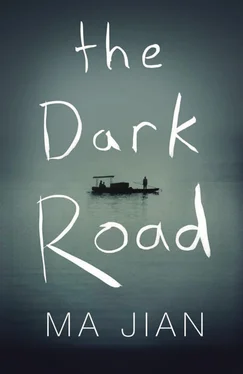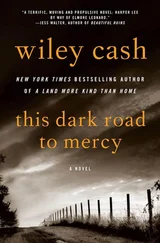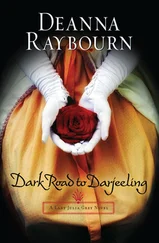‘Come on, let’s go and buy some vegetables,’ says Meili. She pulls a pair of socks over her nylon tights, steps into her kitten-heeled shoes, grabs Nannan’s hand and leads her across the gangplank. As soon as her feet tread onto the bank, her muscles tense with apprehension. ‘Remember, if anyone asks you whether your mum is pregnant, just shake your head. Do you hear me? Don’t babble a load of nonsense like you usually do, or the family planning officers will give you a nasty injection.’ Meili thinks of her primary-school friend Rongrong who was the prettiest girl in the class. Two years ago, she went to hide up in a mountain hut to give birth to an unauthorised child, but when her baby boy was just two weeks old, three family planning officers tracked her down and gang-raped her. She only narrowly escaped with her life, and still has to take herbal medicine for the pelvic disease she contracted.
‘Shh!’ Nannan says, pointing to Meili’s mouth. ‘Give me hot hat!’
Meili pulls a yellow sun hat from her bag and claps it on Nannan’s head.
‘Hurray!’ Nannan cries. ‘Let’s go!’
They ascend the steep stairs to the old town and stroll through the street market. The air reeks of fish. Everyone is shouting. Meili sees dozens of silver carp writhing in the shallow water of a polystyrene box, waiting to be pulled out, slit open and gutted. Bright green mustard tubers and pungent-smelling preserved sprouts lie scattered on the wooden counter above. The stallholder reaches into a large bucket and pulls out the black, mottled tail of a giant salamander. ‘Fancy this wawa fish? I caught it today. It makes wonderful fish stew. Just the thing for pregnant women.’
Fish stew would be nice, Meili thinks to herself. A bit of garlic to bring out the flavour. But that creature would cost at least eight yuan. Too expensive. She remembers the wedding feast she attended last Spring Festival. The steamed fish were still alive when they were served to the guests. Displayed on the centre of each table were two roast chickens, the male mounted on the female, mimicking the position the married couple would adopt later that night. She hasn’t been able to eat chicken since.
‘I want wawa fish, Mum,’ Nannan says, looking down at the wriggling black tail.
‘No, it smells bad,’ says Meili, staring at the guts, fish scales, spinach leaves and noodles trampled onto the ground. She goes to a fruit stall, buys a jin of oranges, peels one and puts a segment in Nannan’s mouth. Nannan wrinkles her nose and says, ‘Too sour! Me no want orange. Me want wawa. If me eat wawa me be wawa too.’
‘Come on, lady, buy this one,’ another fish seller says, walking over with a large bucket. ‘Wawa nourishes the yin and fortifies the yang. It’s a nationally protected species, unique to the Yangtze River. We’re only able to catch them now because of the chaos caused by the dam project. Usually, you’d never get a chance to taste one.’ He leans into the bucket and pulls out a slippery beast that is twice the size of the wawa at the other stall. Its arms and legs flailing wildly, it opens its wide mouth and takes a gulp of air.
‘Why called wawa fish, Mummy?’
‘Because when it mates, it cries “wa-wa”, just like a baby.’
‘Why it called fish? It no look like fish.’
‘It just is. Don’t touch it. It’s very expensive.’ Meili remembers reading that women are given wawa soup during their one-month postpartum confinement to restore their energy and encourage lactation. ‘All right, I’ll buy it,’ she says. But as she digs into her bag for her purse she looks up and sees the words RATHER RIVERS OF BLOOD THAN ONE MORE UNAUTHORISED CHILD sprayed in red paint onto a wall that is splattered with chicken shit and blood. Struck with panic, she abandons the purchase, grabs Nannan’s hand and runs away down a side lane, turns left into another and stops outside a row of half-demolished buildings. ‘Why your face red, Mummy?’ asks Nannan.
‘I’m hot, that’s all.’ Meili pulls off Nannan’s yellow hat and fans her face with it. Her new kitten-heeled shoes are covered in dust.
The deserted lane is littered with broken bricks and refuse. An old man passes through the ruins behind, dragging a bundle of flattened cardboard boxes. Nannan climbs a heap of rubbish and picks up a plastic duck.
‘Drop it, it’s filthy!’ Meili shouts. She thinks of their house in Kong Village. Before Spring Festival this year, she and Kongzi painted the front door and window frames dark red and began re-cementing the yard. She’d wanted to plant an osmanthus tree beside the date tree so that when she opened the windows next spring the house would be filled with its fragrance.
‘Me wash it,’ says Nannan, smiling at the dirty plastic duck. On the broken window frames and doors behind her is an empty can of almond juice and some smouldering charcoal briquettes.
They walk down another lane, climbing over toppled telegraph poles. The segments of wall on either side are still pasted with flyers advertising the services of lock-breakers and door-menders. On a broken bulletin board next to an abandoned shop is a list of women of childbearing age drawn up by the local residents’ committee. Around the next corner they find themselves in a large demolition site from which there appears to be no way out.
‘Mum, that dog poo is dead,’ Nannan says, pointing to two dry turds.
Meili takes Nannan’s hand and enters a roofless building which was once a restaurant. On one of the greasy walls are a photograph of a roast duck on a white platter and a laminated menu featuring Sliced Beef in Hot Chilli Oil and Fish Poached in Pickle Broth.
Meili has lost all sense of direction. She climbs over the rubble and heads downhill, searching for a path. As long as she makes her way down to the river, she’ll be able to find her way back to the barge hotel.
‘Me can’t walk, Mum,’ says Nannan, her floppy sun hat slipping off her hot head.
Meili squeezes her hand and leads her across the shattered tiles and bricks. In the distance she sees a red car speeding past. Assuming it’s driving along a proper road, she walks in that direction, and soon comes to an ancient brick house that’s in the process of being torn down.
A large crowd has gathered to watch. A bulldozer is ramming into the remains of the ground floor. Workers with hammers are pounding the compound walls. The owner of the house bellows a curse, picks up a wooden bed leg and charges at a man dressed in the uniform of a judicial cadre. But before he can strike, three policemen jump on him and throw him to the ground. The cadre shouts, ‘If you continue to put up a fight, you’ll be charged not only with endangering state security but with political crimes as well, and will get three years in jail.’
‘I’m just a simple boat puller,’ the man shouts back, his face contorted with rage. ‘I can’t read or write. What would I know about politics?’
‘We have all the evidence we need. We found the business card of a Hong Kong journalist in your drawer, so we can have you for “resisting the Three Gorges Dam Resettlement Programme” and “divulging state secrets to foreigners”.’
‘What state secrets do you imagine I know? I warn you, if you upset it enough, even a timid rabbit will bite! I’ll take this to the higher authorities. Just wait and see!’ He’s kicking his legs wildly now, as the policemen press his face onto the floorboards and twist his arms behind his back.
An old man in a straw hat, presumably the owner’s father, scrapes some loose plaster from a wall into a paper bag then holds it close to his chest.
An elderly woman beside him wraps her arms tightly around a wooden chair and sobs: ‘The Japanese bombers didn’t manage to flatten our house in 1941. Who would have thought that you Communists would end up destroying it!’
Читать дальше












